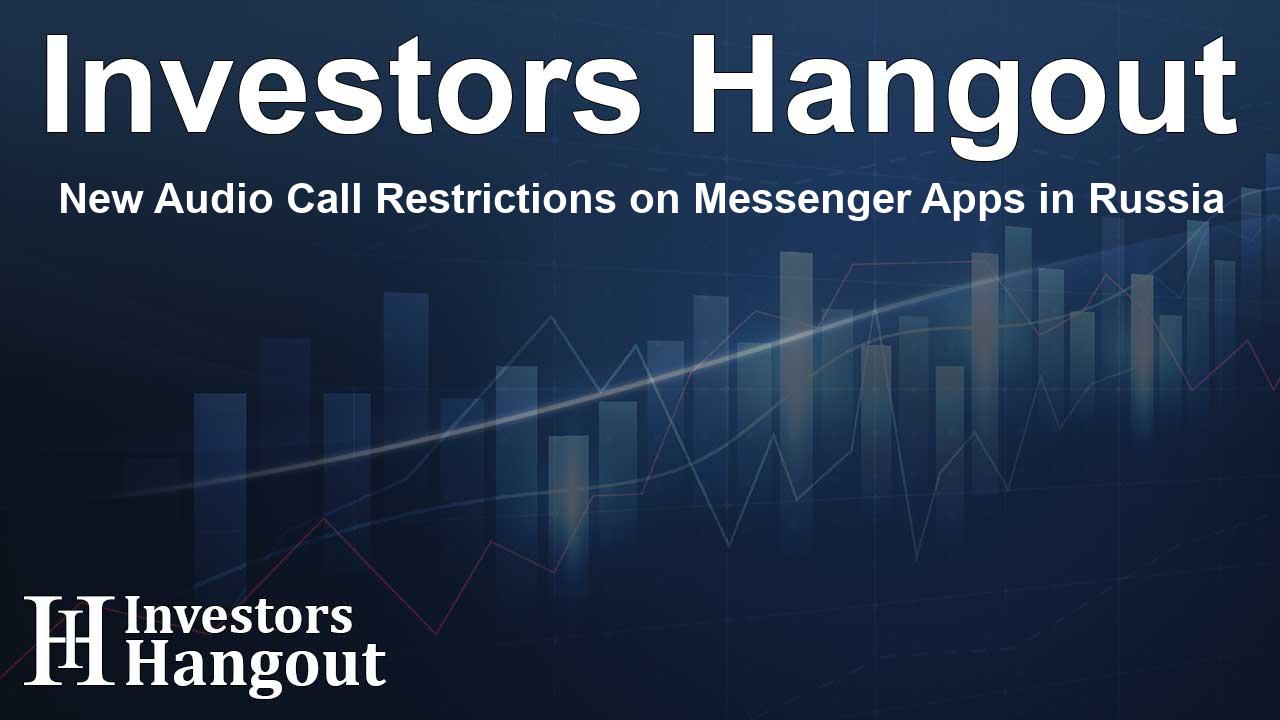New Audio Call Restrictions on Messenger Apps in Russia

New Audio Call Restrictions in Russia
Recently, Russian authorities announced new limitations on audio calls through popular messaging applications, specifically targeting Meta Platforms, Inc.'s WhatsApp and Telegram. This development marks a significant escalation in the government's efforts to tighten its control over digital communication platforms.
Background to the Restrictions
The restrictions have been officially labeled as a "partial" blocking of audio functionalities. The Russian government justifies these measures, stating that they are essential for combating crime and preventing criminal activities facilitated via these messaging services.
A statement from the media watch dog, Roskomnadzor, indicated that Telegram and WhatsApp have been exploited for fraudulent activities such as extortion and even engaging citizens in sabotage. As a result, these services were identified as primary conduits for illicit communications.
The Response from WhatsApp
In response to the government's actions, a spokesperson from WhatsApp insisted that the platform upholds users' rights to secure communication. They argued that the encrypted nature of the service serves as a safeguard against government overreach and that these restrictions unfairly affect over 100 million users in Russia.
The Kremlin’s Internet Control Strategy
These audio call restrictions are just one facet of a wider initiative by the Kremlin to assert greater control over internet access. Over recent years, Russia has progressively enforced stringent laws aimed at curtailing the freedom of its citizens online. This includes banning websites, monitoring internet traffic, and other forms of regulation.
In addition to the recent measures, the Russian government has developed a list of essential websites that will remain accessible in events of shutdowns, especially in regions like Crimea where internet restrictions are likely to become more severe. Such actions are part of an ongoing strategy to enhance state control over digital communication.
Introduction of National Messaging Apps
The Kremlin is also promoting MAX, a state-sponsored messaging application developed by VK, intending to provide an alternative to foreign services like WhatsApp and Telegram. MAX aims to consolidate messaging capabilities with governmental services and payment options. Despite over two million registrations during the beta phase, it remains less popular compared to its international counterparts.
Under recent laws, the MAX application must be pre-installed on all smartphones sold in Russia. Additionally, the system allows authorities access to users' data, raising significant privacy concerns among citizens.
Geopolitical Context and Implications
The introduction of these restrictions coincides with ongoing diplomatic tensions and a highly anticipated meeting between U.S. President Donald Trump and Russian President Vladimir Putin in Alaska. This summit marks a crucial moment in U.S.-Russia relations, particularly considering the backdrop of recent military conflicts and rising sanctions.
During this meeting, discussions are expected to navigate complex issues, including potential ceasefire negotiations and the dynamics affecting energy exports. Trump has emphasized the need for a distinct approach, indicating that the current threats to civilian safety necessitate urgent remedies.
Financial Markets Reaction
On the day of the announcement, Meta's stock faced a decline of 1.26%, although it recovered slightly in after-hours trading. Analysts with a focus on market trends highlight that despite these fluctuations, META continues to demonstrate resilience and an upward trend in its stock performance over both short and long-term periods.
Frequently Asked Questions
What types of calls are being restricted in Russia?
Audio calls made through WhatsApp and Telegram are the main focus of the government's restrictions.
Why is the Russian government implementing these restrictions?
Authorities claim the measures are necessary to combat crime and prevent criminal activities using these applications.
How has WhatsApp responded to the restrictions?
WhatsApp's representatives have defended the platform, arguing that it protects users’ rights to secure communication.
What is MAX, and how does it relate to this situation?
MAX is a state-controlled messaging app launched as an alternative to foreign apps, intended to consolidate communication and government services.
How are these restrictions affecting users in Russia?
These limitations threaten to obstruct the communication of millions of users, impacting both social interactions and business communications.
About The Author
Contact Riley Hayes privately here. Or send an email with ATTN: Riley Hayes as the subject to contact@investorshangout.com.
About Investors Hangout
Investors Hangout is a leading online stock forum for financial discussion and learning, offering a wide range of free tools and resources. It draws in traders of all levels, who exchange market knowledge, investigate trading tactics, and keep an eye on industry developments in real time. Featuring financial articles, stock message boards, quotes, charts, company profiles, and live news updates. Through cooperative learning and a wealth of informational resources, it helps users from novices creating their first portfolios to experts honing their techniques. Join Investors Hangout today: https://investorshangout.com/
The content of this article is based on factual, publicly available information and does not represent legal, financial, or investment advice. Investors Hangout does not offer financial advice, and the author is not a licensed financial advisor. Consult a qualified advisor before making any financial or investment decisions based on this article. This article should not be considered advice to purchase, sell, or hold any securities or other investments. If any of the material provided here is inaccurate, please contact us for corrections.
